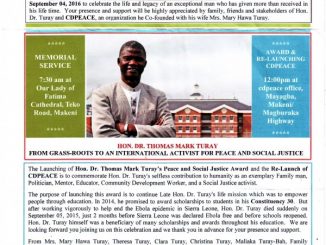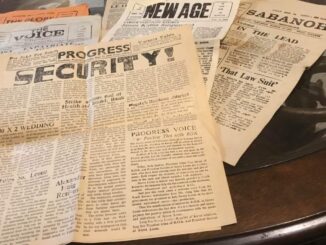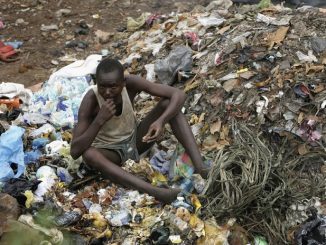
THE OSWALD HANCILES COLUMN
“Corruption Risk”!!!

As he did the last leg of his nationwide Meet-the-People tour in Kailahun District about a week ago in June, 2021, the Commissioner of the Anti-Corruption Commission (ACC), Ben Kaifala, threw light on a clear obstacle to sustainable success in the War on Corruption in Sierra Leone: “CORRUPTION RISK”, he called it.
Ben Kaifala explained “Corruption Risk” thus: “If you have court clerks who impose fines on their people for misdemeanors and collect the money and you don’t pay them on time, you provide an incentive for them to be corrupt”. One way in which the ACC has been addressing such Corruption Risk is to urge public sector Ministries, Departments, and Agencies (MDAs) to establish systems wherein fines and fees would be paid into banks, and not physical cash handed over to government officials. But what happens when there are no banks in rural areas?
Examples of Corruption Risk.
The people of Kailahun District brought up several areas of Corruption Risk. Mohammed Gondowa, and Owen James, teacher and principal of the Pentecostal Secondary School in Kailahun, complained about a problem Ben Kaifala was told about all over the country: government subsidies for functioning of schools would get to the schools late. School administrators need to pay their teachers so they can eat and buy medicines, etc. Where would the money come from when they have to wait six months before government sends them money? In Koindu, an articulate girl in school uniform who looked 15 years of age asked the big “WHY”: “Why is it that our teachers and nurses are working for six months without being paid?”
Resplendently dressed in orange and blue dress, the light-complexioned Nana Jabie, youth leader of the Kissi Teng chiefdom, said they heard about money for women development given by the First Lady, but it never got to them. Other youth leaders said that Youth Development Fund from central government; Constituency Development Fund handled by their parliamentarians… are invisible – no projects done to show for the money. Ben Kaifala said they should be proactive in making demands of their parliamentary and other leadership. He said the ACC had investigated Parliament.
In Koindu, an elderly bespectacled man, Abu Daramy, said money meant for the development of farmers by government has not been getting to them.
Francis Kettoh passionately pointed to the only bank in Koindu which would always make late payments of salaries of public sector workers. Musa Keikular, in black trousers with Rokel Commercial Bank logo embossed on his black T-shirt, lampooned the government pension fund, NASSIT, for not paying pensions to pensioners, thus resulting in pensioners pestering the Rokel Commercial Bank in Kailahun. Ben Kaifala said that anytime such reports had reached the ACC and they would get to NASSIT, the problem would be speedily solved. Two private pension funds were also mentioned for not paying pensions when due. Ben Kaifala said that that was clear corruption, and promised to take action.
The senior medical superintendent in Kailahun District, Dr. Maada Kpangai, had to explain that a contract for the distribution of mosquito nets in Kailahun District were awarded from Freetown, and he was oblivious of it.
A Dr. Kanu was named in Segbwema as the person who got a contract to construct a road in Kailahun District when the APC government of former President Ernest Bai Koroma was in power, but has not completed the road. Ben Kaifala promised to follow up on the matter.
Jusu Sundaima vehemently said the same thing in a meeting in Daru, then chased the ACC Commissioner to the meeting in the Kailahun District Council hall: indigenous commercial loggers would cease paying fees to government because they are suspicious that money they pay would not get into government coffers.
“Why is it that government ministers who hail from our area are sacked and we are not told why they would be sacked?”: a lady asked Ben Kaifala, who responded cleverly: “That question is above me”.
Secretive Governments in Sierra Leone.
From the 1960s to 2021, successive governments in Sierra Leone have been largely opaque; even secretive. This has made it easy for especially people in rural areas to be exploited, and government officials to enrich themselves. There have been laws made by Parliament to address these problems. There is the local government act of 2004 which mandates all the actions and finances of a local government to be publicly posted. 99% of the time this would not be done. There is the Access to Information Act of 2009 – which makes it mandatory for government to inform the people what it aims to do, what it is doing, and what it has done.. in comprehensible languages. 99% of the time this is not done. What has been the result of making laws and not effecting them?
At Segbwema, Lansana Stevens, Acting Head Teacher, Roman Catholic Primary School, bragged that Kailahun District is “The Golden Land” – because of the fertility of their soils for cash crops like cocoa, coffee, oil palm, guava, mango, banana; and because of the “wisest men in Sierra Leone who hail from Kailahun District”. The school he heads has no laboratory, and only former SLPP Chairman, John Benjamin, had donated funds for their sparse library, he told me. Apart from the newly paved roads in Kailahun District, there are no visible signs of wealth that shows that that district has for long being the agricultural breadbasket of Sierra Leone.
Corruption Resulted in “Rebel War”
In front of his mother’s house in Pendembu town, ACC Commissioner, Ben Kaifala, told me he was a small boy in 1991 when the Revolutionary United Front (RUF) ignited the decade-long civil war in Bomaru, not far from Pendembu. “The RUF revels used to pass in front of this house with people they were going kill”, and he pointed to a spot where the killing took place. In Sierra Leone, when we talk about War on Corruption, we must never forget the WAR CORRUPTION FOUGHT ON THE PEOPLE – starting when the SLPP government of Prime Minister Sir. Albert Margai was in power between 1964 and 1967; intensifying
during the APC governments of presidents Siaka Stevens and Joseph Momoh from 1968 to 1992 – resulted in the institutionalization of corruption; the implosion of the economy, creating the conditions for the nastily gruesome civil war of the 1990s. If the people don’t resolutely wage War on Corruption, it could lead to another civil war. What our civil war should teach us is that every child or teenager is a potential armed combatant. Solutions?
Complete Overhaul of Government Necessary!
Complete overhaul of the governance mechanisms in Sierra Leone must be a priority for the Bio Administration. Development must not just be government pointing to roads and bridges and buildings they have constructed; or projects they have launched. Development hinges a lot on PEOPLE having greater TRUST in government; and government creating the justice environment that would give the people confidence that their hard work would be rewarded. Corruption destroys this TRUST. The ACC is in the process of nurturing this vital TRUST; without this TRUST, sustainable development would be elusive, and our country could slide into anarchy again.
Before the civil war from 1961 to 1991; after the civil war from 2002 to 2021, successive SLPP to APC to SLPP to APC to SLPP governments would rationalize, would pamper, would protect their partisans who steal government money. In the short term, it would look eminently logical to protect a corrupt government official who could have helped to finance the campaign of a party in power. In the medium term it is a foolish move. For the APC, it led to the civil war of 1991, and the coup of 1992, rapturously welcomed by the people. For the SLPP, it was the SLPP losing power in 1967 and 2007.
War on Corruption is the PEOPLE’S FIGHT!
Koivaya Amara, the Director of Operations in the ACC, who chaired all the Meet-the-People meetings articulated his mantra: “The War on Corruption is the PEOPLE’S FIGHT!!”
Farma Turay in the Kailahun District Council hall spoke on the MEDIA ALLIANCE AGAINST CORRUPTION he heads. All over the country, representatives of the Sierra Leone Association of Journalists (SLAJ) called upon to make statements pledged their inflexible support to use their broadcast radio stations in the War on Corruption. Most complained that they lack money to buy fuel to air radio programmes regularly.
Will Bio Provide Tough Love Leadership?
Would President Maada Bio learn from history and aggressively and dispassionately wage War on Corruption – like Mao Zedong of China and Lee Kwan Yew of Singapore did, and transformed their countries? He can! He must. Or, he commits political suicide for the SLPP. When the President sacked former lands minister, Denis Sandy, and kept the reason secret, he present an instance of Corruption Risk. When the Ben Kaifala-led ACC reach out-of-court-
settlements with government officials who confess their corruption-guilt and the ACC would be SILENT of the sums stolen and in what context, that is a Corruption Risk by the ACC. (If a government official steals government money of, for example, Le10billion and pays back Le500 million to government, it is a Corruption Risk – a clear incentive for others to be corrupt). The special court for anti-corruption in the judiciary must be made to work; or, the Chief Justice be forced to resign for failing to make it work. The people have to be mobilized to draft bills for Parliament to make tougher anti-corruption laws, which could include making rank INEFFICIENCY by government officials which enhances Corruption Risk a corruption act (if a finance ministry official fails to ensure salaries get to teachers in Kailahun or Koinadugu on time, for example, that should be corruption) that can be indicted and prosecuted.
I pause,
Oswald Hanciles, The Guru.
June 14, 2021
15:57 hours in Freetown, Sierra Leone
+232-76-757634
WhatsApp Number
Email addresses: [email protected]/[email protected]



